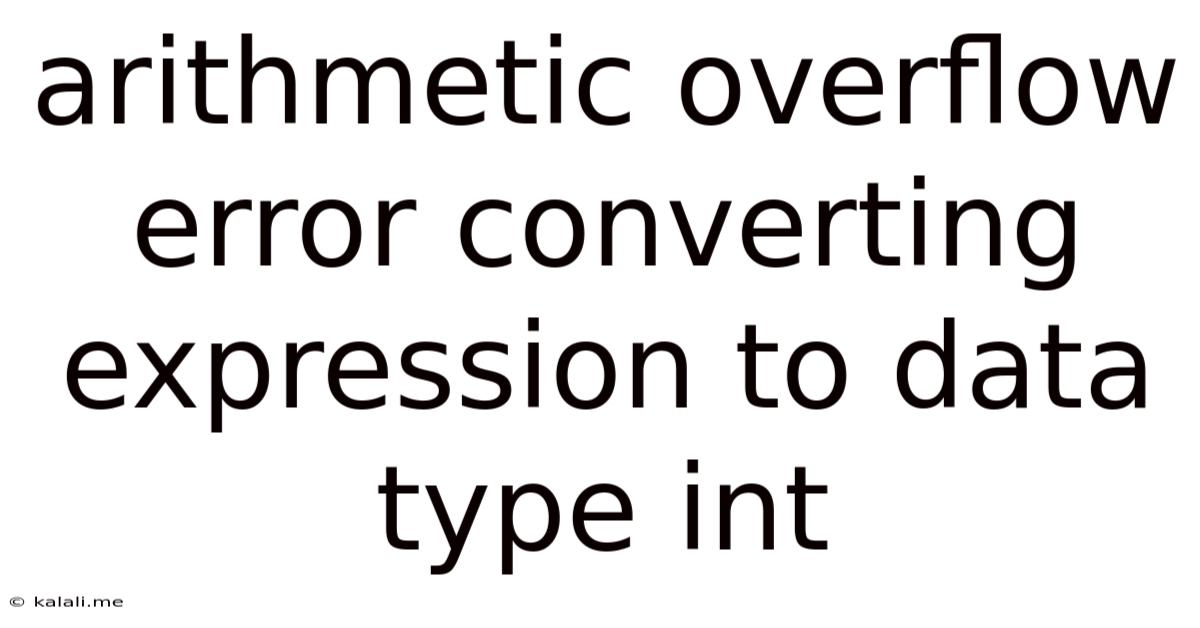Arithmetic Overflow Error Converting Expression To Data Type Int
Kalali
May 25, 2025 · 3 min read

Table of Contents
Arithmetic Overflow Error Converting Expression to Data Type INT: A Comprehensive Guide
Arithmetic overflow errors, specifically those related to converting expressions to the integer data type (INT), are a common programming headache. This error occurs when the result of an arithmetic operation exceeds the maximum value that can be stored in an integer variable. This article will delve into the causes, consequences, and solutions for this frustrating problem across various programming languages. Understanding this error is crucial for writing robust and reliable code.
What Causes an Arithmetic Overflow Error?
The core issue stems from the limited range of values that integer data types can hold. An int variable has a fixed size (typically 32 or 64 bits), defining a minimum and maximum value it can represent. When an arithmetic operation (addition, subtraction, multiplication, or division) produces a result outside this range, an overflow occurs. This leads to unexpected behavior, ranging from silently incorrect results to program crashes.
For example, in a 32-bit system, a signed integer can typically hold values from -2,147,483,648 to 2,147,483,647. Adding two large positive numbers could easily exceed this upper limit, resulting in an overflow. Similarly, subtracting a large negative number from a small positive number might cause an underflow (exceeding the minimum value).
Consequences of Arithmetic Overflow
The consequences of an arithmetic overflow can be subtle and difficult to debug. Depending on the programming language and system architecture, the overflow might:
- Wrap around: The result might "wrap around" to the opposite end of the integer range. For instance, adding 1 to the maximum value might result in the minimum value. This can lead to completely incorrect and unpredictable calculations.
- Produce an exception: Some languages and environments might throw an exception, explicitly signaling the error. This is generally preferable as it allows you to handle the error gracefully.
- Silent failure: In some cases, the overflow might go unnoticed, leading to subtle bugs that are hard to track down. This is especially dangerous because the program might continue to execute with incorrect data.
How to Prevent and Handle Arithmetic Overflow
Preventing and handling arithmetic overflow requires a multi-pronged approach:
1. Choosing Appropriate Data Types:
- Use larger integer types: If you anticipate dealing with potentially large numbers, consider using larger integer types like
long,long long, or even arbitrary-precision integer libraries. These types offer a wider range of values, reducing the likelihood of overflow. - Use unsigned integers: If you know your numbers will always be positive, use unsigned integers (e.g.,
unsigned int). This doubles the positive range available compared to signed integers.
2. Input Validation:
- Check input values: Before performing any arithmetic operations, validate the input values to ensure they are within the acceptable range for your chosen data types. This prevents invalid data from causing overflows.
3. Range Checking:
- Perform range checks: Before and after operations, check whether the results fall within the expected range. This allows for early detection of potential overflows.
4. Exception Handling (where supported):
- Use try-catch blocks: In languages that support exceptions, wrap your arithmetic operations in try-catch blocks to handle overflow exceptions gracefully. This allows you to take appropriate action, such as logging the error, displaying an error message, or using a default value.
5. Using Arbitrary-Precision Arithmetic Libraries:
For applications requiring extremely large numbers or high precision, consider using libraries that support arbitrary-precision arithmetic. These libraries can handle numbers of virtually any size, eliminating the risk of overflow altogether.
Example (Illustrative - Language-Specific Syntax May Vary):
While the exact implementation varies between languages, the core principles remain consistent. The below example demonstrates a basic approach to range checking:
#include
#include
int main() {
int a = 2147483640;
int b = 100;
if ( (std::numeric_limits::max() - a) < b) {
std::cerr << "Potential overflow detected!" << std::endl;
} else {
int result = a + b;
std::cout << "Result: " << result << std::endl;
}
return 0;
}
By implementing these strategies, developers can significantly reduce the risk of arithmetic overflow errors, leading to more robust and reliable software. Remember that proactive planning and careful consideration of data types are crucial in avoiding this common programming pitfall.
Latest Posts
Latest Posts
-
What Is 1 2 Equivalent To In Fractions
Jul 06, 2025
-
How Do You Say Pork In Spanish
Jul 06, 2025
Related Post
Thank you for visiting our website which covers about Arithmetic Overflow Error Converting Expression To Data Type Int . We hope the information provided has been useful to you. Feel free to contact us if you have any questions or need further assistance. See you next time and don't miss to bookmark.